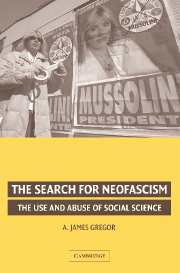Book contents
- Frontmatter
- Contents
- Preface
- Acknowledgments
- 1 The Decay of an Enterprise
- 2 Fascism
- 3 Neofascism: Some Presumptive Candidates
- 4 Julius Evola, Fascism, and Neofascism
- 5 Black Nationalism and Neofascism: Marcus Garvey and the Universal Negro Improvement Association
- 6 Black Nationalism and Neofascism: Elijah Muhammad and the Lost-Found Nation of Islam
- 7 Islamofascism: Neofascism in the Middle East
- 8 Hindutva: The Case for a Saffron Fascism
- 9 Post-Maoist China: Fascism with Chinese Characteristics
- 10 Conclusions
- Index
4 - Julius Evola, Fascism, and Neofascism
Published online by Cambridge University Press: 05 June 2012
- Frontmatter
- Contents
- Preface
- Acknowledgments
- 1 The Decay of an Enterprise
- 2 Fascism
- 3 Neofascism: Some Presumptive Candidates
- 4 Julius Evola, Fascism, and Neofascism
- 5 Black Nationalism and Neofascism: Marcus Garvey and the Universal Negro Improvement Association
- 6 Black Nationalism and Neofascism: Elijah Muhammad and the Lost-Found Nation of Islam
- 7 Islamofascism: Neofascism in the Middle East
- 8 Hindutva: The Case for a Saffron Fascism
- 9 Post-Maoist China: Fascism with Chinese Characteristics
- 10 Conclusions
- Index
Summary
One of the more curious features of the search for neofascism after the termination of the Second World War is the insistence, on the part of some of the most widely known researchers, that Julius Cesare Andrae Evola, born in Rome on the 19 May 1898, scion of an ancient aristocratic family, provided the neofascism of post–World War II Europe its ideology. Evola has been seen as the source of neofascism's ideological rationale. It was his ideas that lent neofascism its substance. Umberto Eco, who identifies “traditionalism” as essential to the “Ur Fascism” that he argues serves as the core of generic neofascism, cites no one other than Evola as its critical exponent.
Others have identified Evola's thought as quintessentially fascist, as “creative” and “original.” For still others, he is spoken of as a “post-war fascist,” insisting that, after the passing of historic Fascism, his thought provided the inspiration for a resuscitated European neofascism. Together with that, we are confidently told that Evola became a source of neofascist ideological thought because Mussolini's “Fascism had few true believers who could … write articles and books.” Because so few Fascists of the time of the Ventennio were capable of writing articles or books, Evola, as one of the few, provided the texts that became one of “the most important” sources for the neofascism that arose out of the ruins of the Second World War.
- Type
- Chapter
- Information
- The Search for NeofascismThe Use and Abuse of Social Science, pp. 83 - 110Publisher: Cambridge University PressPrint publication year: 2006



